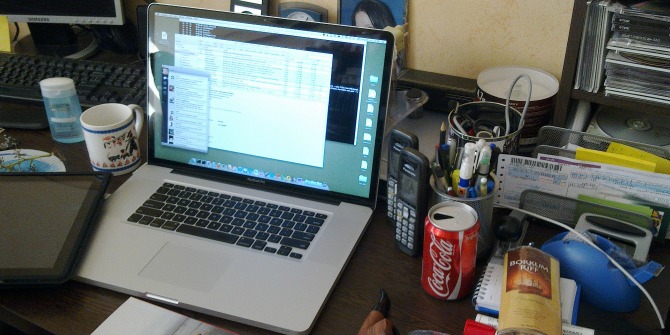
To start a new venture, entrepreneurs need to recognise a profitable business opportunity, and to do this, they must have supportive and positive views about their professional past, present, and future (that is, a supportive and positive professional time perspective). Yet, they may have had negative professional experiences in the past and they may be having similar experiences in the present. If this is the case, these experiences certainly cannot help entrepreneurs stay positive towards the future. So, the question is: how can they identify a business opportunity in their environment and evaluate its profit potential when they do not have supportive and positive past and present experiences?
Many works (see examples here and here) have highlighted the positive relationship between positive affect and creativity. And entrepreneurs often advance by making new and innovative associations between multiple pieces of information, which then point to potentially profitable opportunities. Unfortunately, negative experiences do not help them to broaden their thinking and enhance their creativity, both core components of entrepreneurship that contribute to opportunity identification.
The good news, however, is that they can learn to recognize the downsides and potentials of their professional time perspectives and work with them to become better able to identify profitable opportunities and assess their potential. We contend that the impact of negative experiences is not unchangeable: with specific exercises, entrepreneurs can learn to manage and balance the three temporal dimensions. This is especially important for business creators because they often put in long and stressful hours. A heavy workload combined with other important responsibilities (e.g., accepting that, to some extent, they hold the future of their families and employees in their hands) makes them more vulnerable to negative thinking, which can be detrimental to performance. Bearing this is mind, we have developed guidelines to help entrepreneurs manage their time perspectives more effectively.
Past professional experiences
Writing down your thoughts and emotions is likely to be helpful in making sense of negative past professional experiences. It can equip you to move forward, especially if you start combining these new, multiple pieces of information. You can also focus on your positive professional experiences by, for example, writing a summary of them and sending it on, along with your thoughts, to the colleagues who shared the experiences with you. Again, collecting and combining these recollections with other pieces of information not only enables you to deal with past experiences, but also gives you a large set of information that will facilitate the process of making new and potentially innovative associations.
Present professional experiences
To manage and counterbalance the negative professional experiences you might be having now, one helpful step is to be mindful of your autonomy as you make decisions in selecting, analysing, and connecting diverse information at work. In this way, you stay focused on more positive and potentially rewarding activities. Living in the present moment with other more positive colleagues is another way to manage negative experiences. As you share large sets of information with them, you might well increase your chances of identifying a business opportunity that you could then evaluate in terms of feasibility and profit potential.
Future professional experiences
Writing your goals down will certainly help clarify your priorities. However, to keep striving to reach your goals with a positive vision of the future, you also need to have your personal batteries fully charged. You might therefore consider starting worry reduction, relaxation, or yoga exercises, all of which are likely to help you in associating all the information you have at hand to identify and evaluate an opportunity (seen here as the connection of previously collected but unrelated pieces of information). Ultimately, a new venture can be the means by which you exploit a potentially profitable opportunity and achieve your goals.
In sum, we hope to have suggested some of the ways that entrepreneurs can manage and even change their professional time perspectives. Information on this topic is important, not just for the entrepreneurs, but also for policymakers, consultants, and coaches. The key idea is that positive professional views of the past, present and future need to be supported by the entrepreneurs themselves, as well as by the people who work with them (consultants, coaches, etc.). As explained above, managing these views is important, as they can lead entrepreneurs to opportunity discovery, a central element of entrepreneurship.
We hope to inspire future work. For example, researchers could investigate the relationship between age and the professional time perspective. It seems likely that entrepreneurs in different age groups would manage time perspectives differently, with the effects on key aspects of entrepreneurship (e.g., opportunity identification) also differing. Therefore, we ask: Do older entrepreneurs spend less time searching and associating information and evaluating opportunities? How do their professional time perspectives relate to their time management? Why? We thus invite researchers to focus more on this potentially fruitful area of research.
♣♣♣
Notes:
- This blog post gives the views of its author, not the position of LSE Business Review or the London School of Economics.
- Featured image by Trent Szmolnik on Unsplash
- Before commenting, please read our Comment Policy
 Ludvig Levasseur serves as a junior research fellow at the Institute for Development Strategies of the School of Public and Environmental Affairs of Indiana University. In 2018, he served as a post-doctoral researcher in entrepreneurship at the School of Entrepreneurship of the Spears School of Business of Oklahoma State University. His research interests notably include entrepreneurial cognition and affect, time perspective, family business, and venture capital. In 2016, he received his doctoral degree in management from Paris Sciences et Lettres-Université Paris-Dauphine. E-mail: ludvig.levasseur@hotmail.fr Telephone: 0033660070825.
Ludvig Levasseur serves as a junior research fellow at the Institute for Development Strategies of the School of Public and Environmental Affairs of Indiana University. In 2018, he served as a post-doctoral researcher in entrepreneurship at the School of Entrepreneurship of the Spears School of Business of Oklahoma State University. His research interests notably include entrepreneurial cognition and affect, time perspective, family business, and venture capital. In 2016, he received his doctoral degree in management from Paris Sciences et Lettres-Université Paris-Dauphine. E-mail: ludvig.levasseur@hotmail.fr Telephone: 0033660070825.





